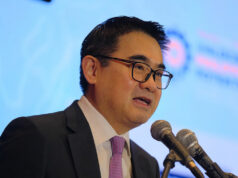Debt yields down on Fed rate hike, Fitch rating move
YIELDS on government securities (GS) ended lower last week as the Federal Reserve turned dovish after its interest rate hike and on the back of slower US consumer price index (CPI) data and the Philippines’ credit rating upgrade.
Bond yields, which move opposite to prices, fell by an average of 0.11 basis point (bp) week on week, data from the Philippine Dealing & Exchange Corp. as of Dec. 15 showed.
“Government securities fell by an average of 0.11 basis point week on week on a dovish Fed and lower US CPI,” Carlyn Therese X. Dulay, vice-president and head of institutional sales at Security Bank Corp. (Security Bank), said in an e-mail.
Land Bank of the Philippines (Landbank) market economist Guian Angelo S. Dumalagan said yields fell primarily because of the upgrade received by the Philippines from Fitch Ratings.
“The downward bias was minute, as were also upward forces last week that almost offset the impact of the credit upgrade,” added Mr. Dumalagan.
Ruben Carlo O. Asuncion, chief economist at UnionBank of the Philippines, Inc., said via e-mail that yield movements were minimal.
“Downward pressure came from recent events [last] week on monetary policy directions of advanced countries. The uncertainty of the pace of the tightening is fuelling these movements,” added Mr. Asuncion.
A bond trader added that last week’s trading activity was “lackadaisical” as investors awaited the Bangko Sentral ng Pilipinas’ (BSP) decision on top of the US Fed, European Central Bank and Bank of England policy meetings.
“Relatively, no fireworks from these meetings, market players opted to keep to the sidelines with traders simply servicing client-based requirements,” the bond trader added.
The BSP Monetary Board kept borrowing rates unchanged during its eighth and final policy review for 2017.
Rates stayed at 3.5% for the overnight lending rate, 3.0% for the overnight reverse repurchase rate, and 2.5% for overnight deposit.
The BSP’s decision followed this year’s third rate increase from the Federal Reserve during its two-day review. Central bank officials have said that they need not move in sync with the Fed, as they focus more on domestic developments in setting interest rates.
The US central bank raised rates by a quarter of a percentage point to a range of 1.25% to 1.5%. It expects three more hikes in both 2018 and 2019, unchanged from the last round of forecasts in September.
However, the market perceived the rate hike to be dovish, with two out of the twelve members of the Federal Open Market Committee, namely Charles L. Evans and Neel Kashkari, voting against the move.
In its justification for Wednesday’s rate increase, which was widely expected by financial markets, the Fed’s policy-setting committee cited “solid” economic growth and job gains.
Meanwhile, the US Labor Department said its CPI excluding the volatile food and energy components slowed to 1.7% in November from 1.8% in October as prices for airline fares and household furnishing declined.
The overall CPI increased 0.4% in November after edging up 0.1% in October. That raised the year-on-year increase in the CPI to 2.2% from 2% in October.
Back home, at the close of trading at the secondary market last Friday, in the short end of the yield curve, debt yields went down across the board. Yields on the 91-, 182- and 364-day Treasury bills dropped 3.61 bps to 3.1193%, 3.18 bps to 3.2521%, and 10.91 bps to 3.0194%, respectively.
In the belly, all debt yields also declined. The two-, three-, four, five- and seven-year Treasury bonds (T-bond) saw their rates drop by 2.26 bps to 4.0519%, 10 bps to 4.25%, 10.92 bps to 4.8279%, 4.77 bps to 4.6843% and 4.82 bps to 5.2982%, respectively.
On the other hand, in the long end of the curve, yields on the 10- and 20-year T-bonds went up 10.5 bps to 5.685% and 38.83 bps to 5.6074%.
Looking forward, Landbank’s Mr. Dumalagan said yields might see an upward correction, as likely strong US third-quarter growth data and positive developments on the US tax bill might divert investors’ attention back to prospects of three more interest rate hikes in 2018.
Meanwhile, Security Bank’s Ms. Dulay expects the securities market to remain range-bound as participants await the four-year Treasury bond reissuance tomorrow, which is expected to print between 4.5% and 4.625%.
UnionBank’s Mr. Asuncion said this week would be more of the same as the year comes to an end. — Lourdes O. Pilar



